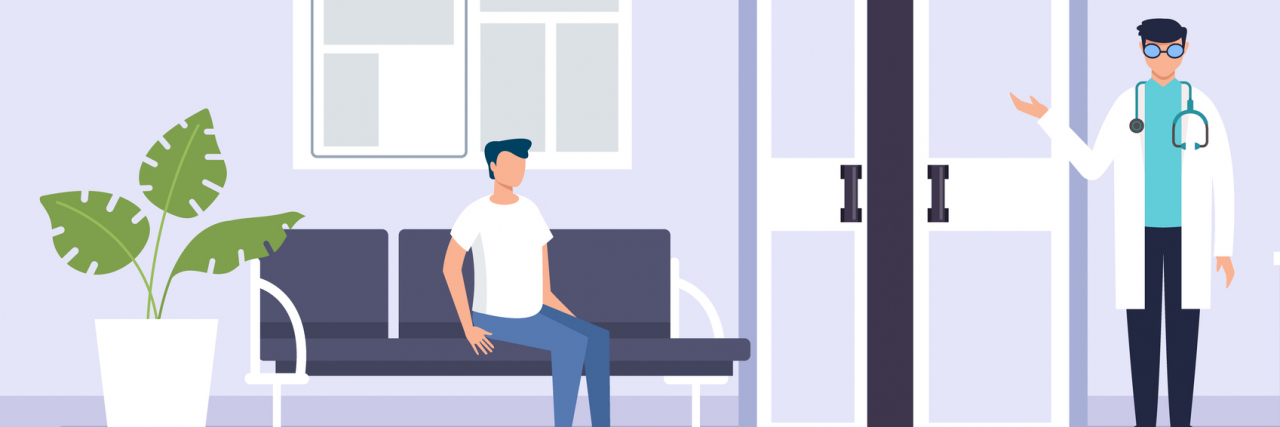When Childhood Trauma Meets Medical Trauma
Editor's Note
If you have experienced emotional abuse, the following post could be potentially triggering. You can contact the Crisis Text Line by texting “START” to 741741.
I have always had flashbacks during doctor’s appointments, but they weren’t noticeable to me until I became chronically ill.
Trauma during my development programmed me to avoid asking for help at all costs. It’s just too risky. But there are times when we have no choice, like when we must go to the doctor and tend to our health needs.
The act of going to the doctor is inherently an act of requesting help or assistance, and the trauma I endured in childhood told me I couldn’t or shouldn’t ask for help. Asking for help could be dangerous and cause more problems than it solved. I often preferred to figure things out on my own.
Of the four main fear or trauma responses (fight, flight, freeze, fawn), I tend to lean into freeze and fawn when faced with scary social situations. I would dissociate when the doctor entered the room (freeze response) and a protective part of me would navigate the appointment, asking the necessary questions, but also displaying a friendly, compliant façade (fawn response).
Honestly, that progression of internal mechanisms felt normal and natural to me. For a while, I even thought I enjoyed going to the doctor, and perhaps that protective fawning part of me did enjoy it, as they were well-liked.
But then my health became more complicated. I started having symptoms I wanted and needed real help with. My ability to eat was diminishing, my mobility was diminishing, my pain was increasing, and my fear was escalating. I kept my doctor updated, asked him directly for assistance, but he couldn’t or wouldn’t do anything. He claimed to be unable to help me, and as I relied on him for this, I felt more helpless, insignificant, and broken with each appointment.
I didn’t know it at the time, but I was reexperiencing the same trauma I endured during my childhood. Just like my developmental experiences, my doctor had the power to believe me, to guide me, and to assist in my well-being, and he chose to abandon me. And since I’ve become chronically ill, I have had too many experiences like that to count.
Yes, I have medical trauma. But it didn’t start in the doctor’s office. The majority of my medical trauma is an extension, another layer, of the same traumas I endured since I was born. Being dismissed, ignored, and diminished is not new to me. The idea that dire consequences will befall me if I don’t get help is not new to me. Gatekeeping to the basic needs I deserve as a human being is not new to me. This was my childhood.
Repeating these experiences in the doctor’s office wakes up the child inside me who screams that we are in danger and we must escape at all costs. This pulls my emotional experience into fighting anger, flighty anxiety, frozen dissociation, and fawning friendliness all at once. I struggle to maintain my composure as the child inside my body throws fits and screeches in my head, an all systems alarm intended to protect me.
I wish I could protect myself from doctors. That is the deepest desire of my heart, the deepest need of my inner child. But I am chronically ill. I need medical care. And I repeatedly encounter doctors who reenact the traumatic experiences of my childhood. My child self and I will return to the doctor’s office, and I will do my best to soothe, manage, tolerate, and recover. In this sense, I cannot protect myself entirely.
But there are some specific things I can do to exercise protection and prove to my inner child that we are not in the same kind of danger we were in during childhood.
Lean on my allies.
I can insulate myself from the impacts of these traumatic experiences by surrounding myself with supportive voices, seeking advocacy when needed, and talking to my peer support counselor.
Set boundaries with my doctors.
I can stop seeing doctors who cause me harm and keep searching for doctors who will listen and provide me with sufficient care. I am allowed to look for medical care that works best for me.
Recognize on my strengths.
I can focus on the ways in which my personal practices have improved my well-being outside of doctors offices, and the fulfilling work I do for myself and my loved ones.
Focus on my recovery work.
I can congratulate and encourage myself for practicing, accessing, or attempting to use my trauma skills when I am faced with flashbacks and/or re-traumatizing events. And I can lean into my grief, giving myself the compassion and validation I have always needed to process this kind of pain.
Medical trauma makes me feel trapped, because I already survived this kind of abuse, and I will inevitably face it again and again. But I am not trapped, nor am I helpless. I have options, I have resources, and I have my life experience to lean on and learn from.
Getty image by PrettyVectors

